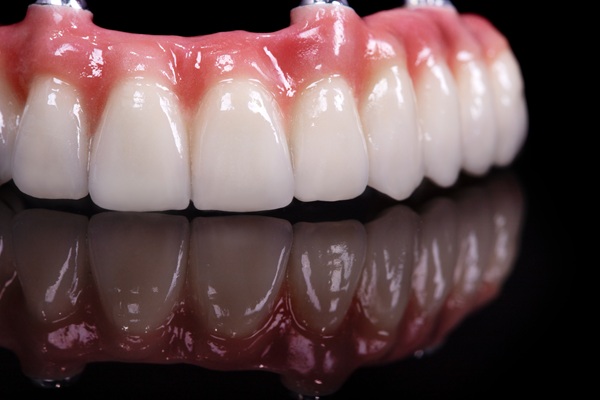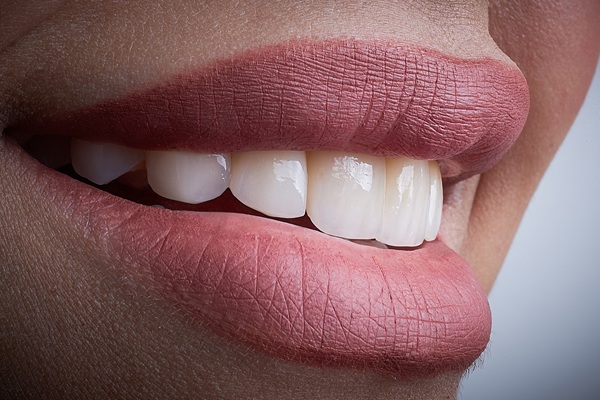Getting Dentures to Replace Missing Teeth

If you are missing one or more teeth, you have several tooth replacement options from which to choose. One such option is dentures. Though dentures are no longer the preferred tooth replacement option for neither dentists nor patients, they continue to have a purpose. For some people, dentures are the only option. For others, they offer the affordability that other, more intensive restoration methods, such as implants, cannot provide. Regardless of your reason for choosing dentures, there are a few things you should know about this common prosthetic.
Types of dentures
Dentures fall into two main categories: complete and partial. Which type a dentist recommends depends on how many teeth a patient is missing and whether the teeth adjacent to the gap are healthy.
A complete denture is designed to replace all the teeth in a single upper or lower arch. A partial denture, on the other hand, can help to replace anywhere from one to a handful of teeth. Partial dentures utilize ceramic or metal clasps, which anchor onto healthy teeth that are adjacent to the gap.
In some cases, dentists recommend a hybrid approach that utilizes both dentures and implants. They refer to such a setup as “implant-supported dentures.” With implant-supported dentures, a dentist may install one or two implants adjacent to a gap to serve as support for a partial denture. Implant-supported dentures are more durable than standard full or partial dentures.
Living with dentures
Dentures require wearers to make significant adjustments to their lifestyles in the early days of use. They also require substantial care and maintenance. Below are just a few things tooth loss patients must understand about life with dentures.
Dentures affect speech
Teeth play a large role in how one speaks. When individuals lose teeth, their speech becomes impaired. While dentures help to correct speech hindered by missing teeth, they often make it difficult for wearers to talk for the first few months. This is because dentures sit loosely along the gum line and shift around as the mouth moves. As a result, wearers must practice talking in the early days of denture use.
Dentures affect diet
Though dentures resemble teeth, they are much weaker than the real deal. Also, because of how they are constructed, they make it difficult for wearers to chew their food comfortably or effectively. As a result, dentists recommend that denture patients stick to soft foods they can chew easily.
Dentures affect oral health
Again, though dentures resemble teeth, they are far from capable of providing the benefits that actual teeth and implants offer. One such benefit is jaw and bone support. After as few as six months of wear, the jawbone may begin to deteriorate and the gums to shrink. Either occurrence can cause dentures to become ill-fitting and for any remaining natural teeth to become loose and fall out. To help with the loose-fitting dentures, patients must undergo fittings for new sets every six months to a year. There is little a dentist can do to correct a shrunken jawbone, though.
Conclusion
Dentures are a common and effective tooth replacement option. If you are interested a complete or partial set, discuss the pros and cons with your dentist today.
Request an appointment here: https://alamedadentalaurora.com or call Alameda Dental at (303) 343-7072 for an appointment in our Aurora office.
Check out what others are saying about our dental services on Yelp: Dentures in Aurora, CO.
Recent Posts
Dentures are an excellent option for those who have lost teeth, but denture care is often overlooked by people new to wearing dentures. There are many ways to maintain your dentures so they last as long as possible and stay clean. Denture care is essential because not caring for your dentures can do some damage.…
As teeth get older, you may have to consider replacing them with dentures or partial dentures. This can lead to a lot of questions, especially if a person has never owned dentures previously. It is important to understand the current condition of one’s teeth in order to determine the right denture fit. Teeth naturally wear…
For some people, the idea of getting dentures can be a scary prospect. If you are in this situation, it may mean that you have lost most or all of your teeth. This could have happened because they were severely decayed or many of them were damaged in a serious accident. Regardless of why you…
Dental implants are often used to replace individual teeth but can also offer multiple teeth replacement options. Such options include cantilever bridges, implant-supported bridges and implant-supported partials.Depending upon the condition of the person's gums and jawbone, a single implant can sometimes be placed to support two adjacent teeth. More commonly, multiple implants are used to…


